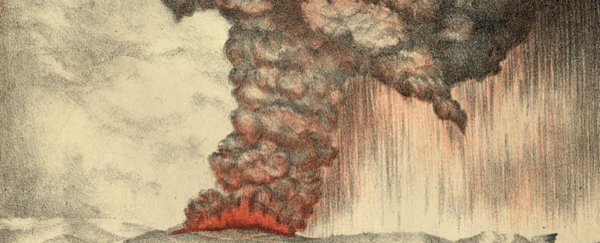It shattered eardrums more than 50 km away.
On 27 August 1883, Earth made the loudest noise in recorded history.
Emanating from the island of Krakatoa, which sits between the islands of Java and Sumatra in Indonesia, the sound could be heard clearly almost 5,000 kilometres (3,100 miles) away and by people across 50 different geological locations around the world.
According to Aatish Bhatia at Nautilus, about 3,200 kilometres (1,988 miles) away from Krakatoa, residents of New Guinea and Western Australia reported hearing "a series of loud reports, resembling those of artillery in a north-westerly direction".
And over 4,800 kilometres (2,983 miles) away on the island of Rodrigues in the Indian Ocean, locals reported hearing what sounded to them like the distant roar of heavy gun fire.
The sound was caused by a record-breaking volcanic eruption that sent smoke up almost 80 kilometres (50 miles) into the air as ash fell into the ocean some 20 kilometres (12.4 miles) away.
Burning hot debris was shot from the mouth of Krakatoa's volcano at speeds of up to 2,575 kilometres per hour (1,600 mph), which is more than double the speed of sound.
The event has been called the greatest natural disaster of the 19th century, because with such an incredible release of pressure also came severe consequences for the surrounding area.
Shock waves from the eruption travelled around the world several times, and created a tsunami over 45 metres tall (148 feet) and weighing 600 tonnes, which ended up hitting the shores of Java and Sumatra and absolutely decimating their coastal regions.
Far away in South African waters, ships were being rocked by another set of tsunamis. And you wouldn't have wanted to be on the water less than 100 kilometres (62 miles) from Krakatoa at the time, as Bhatia explains at Nautilus:
The British ship Norham Castle was 40 miles [64 kilometres] from Krakatoa at the time of the explosion. The ship's captain wrote in his log, "So violent are the explosions that the ear-drums of over half my crew have been shattered. My last thoughts are with my dear wife. I am convinced that the Day of Judgement has come."
According to The Independent,The Independent, the force of the blast was 10,000 times that of a hydrogen bomb, and Bhatia reports that the sound was registered at around 172 decibels over 160 kilometres away (100 miles).
That's bonkers, seeing as the human threshold for pain is 130 decibels, and the sound of a jet engine when you're standing right next to it is 150 decibels.
Not quite as explosive (fortunately!) as Krakatoa, but impressive nonetheless, this video shot by a couple in Papua New Guinea shows a volcano erupting and the shock wave that followed.
They kept it together a whole lot better than I would have:
A version of this article was first published in September 2014.
